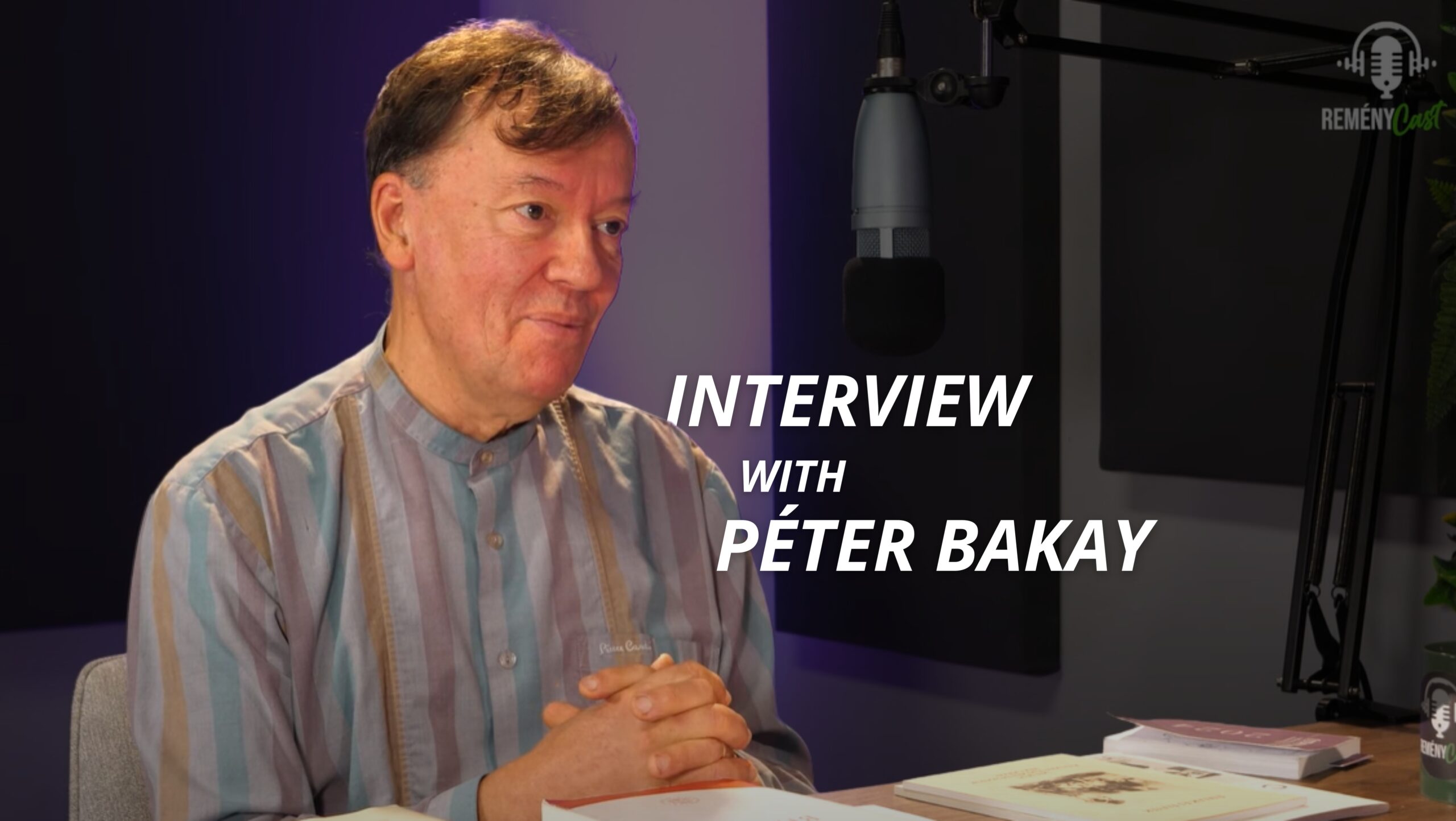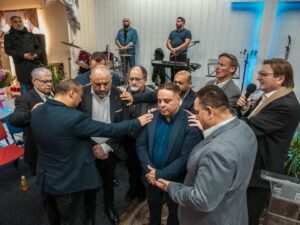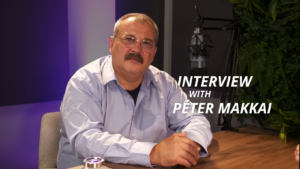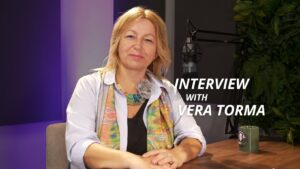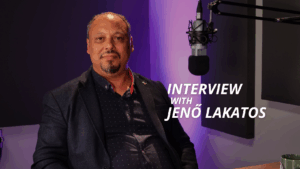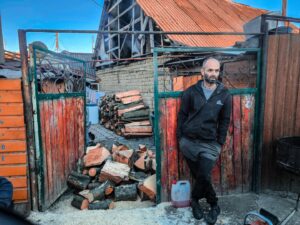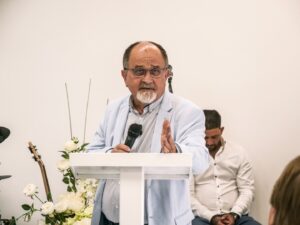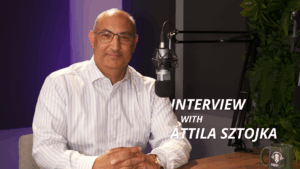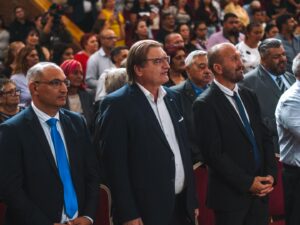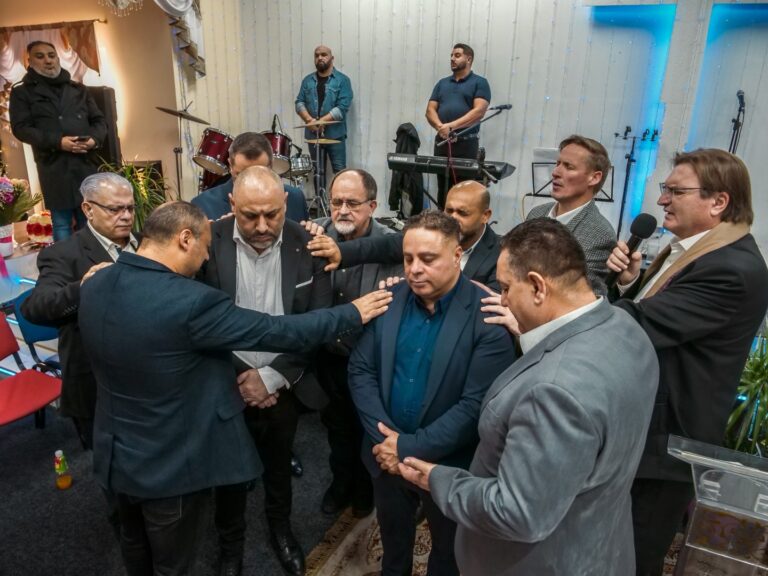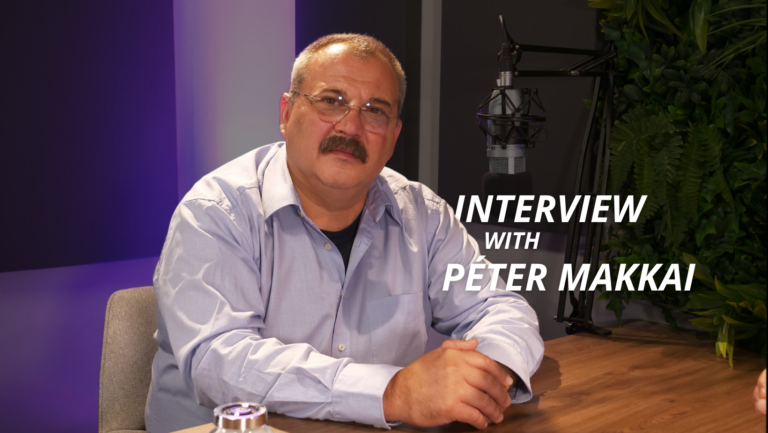Péter Bakay, pastor and representative of the Evangelical Church’s Roma mission, is our guest in this episode. We discuss numerous interesting and important topics: we gain insight into his missionary work, learn about the Evangelical Church’s approach to the Roma community, and how this could shape the future of Roma communities. We also talk about the collaboration between the Evangelical and Pentecostal Roma missions, building bridges, the possibilities for change, and Péter Bakay’s personal hopes. Stay with us!
We warmly welcome you to our studio! Could you share how your family background influenced your journey into this ministry?
Thank you for the invitation! I grew up in a traditional religious family. Both my great-grandfather and grandfather were Evangelical pastors, and I often spent time with my grandfather, who read the Bible daily. In my childhood, faith was more of a family tradition than a personal choice. I attended a church school, which was particularly valuable during the communist era.
The turning point in my faith journey came after graduation, when a classmate, who had recently converted, told me, “Jesus is alive.” This sparked a deeper search within me. I realized that faith is not just a family tradition or a rational acceptance of truth—it’s a personal relationship with Jesus that requires a conscious decision.
Could you share how your conversion took place and what this encounter with Christ has meant to you personally?
My conversion was a three-month-long process marked by struggles and soul-searching. For me, conversion is encountering Christ in a way that transforms every aspect of your life. It’s not just a theoretical acceptance —it’s deeply personal.
The breakthrough moment came while listening to a sermon on a cassette tape, where the preacher said, “God casts your sin behind His back.” At that moment, I understood that God accepts and forgives me unconditionally, no matter how big or small my sins seemed. Rebirth became a reality for me, not through my efforts, but as a gift from God. This experience changed my life completely and strengthened my conviction that God is actively present and personally cares for us.
Was becoming a pastor a continuation of your family’s legacy? How did this influence your spiritual journey?
While my family’s history of pastoral service certainly influenced me, the most important factor was my personal encounter with Christ. I believe denominational affiliation is secondary. The goal is not for someone to become Evangelical if they have already found Christ in another denomination. Whether one is Catholic, Reformed, or Pentecostal, the essential thing is to have a real, living relationship with Christ.
At the Last Judgment, it won’t matter which denomination you belonged to or how strictly you followed church traditions—it’s about how Christ-like you were. This is the measure I strive to encourage in my ministry.
What inspired you to focus your ministry on the Roma community?
My sensitivity toward the Roma community began in childhood. My father, who worked as a judge, often interacted with Roma people in the courthouse and treated them with respect and humanity. I distinctly remember when my father ordered Hungary’s first Roma-Hungarian dictionary—it showed me his genuine interest in understanding and valuing Roma culture. This example of acceptance and empathy left a lasting impression on me.
During my theological studies and early pastoral work, my interest in the Roma community grew deeper. As Roma art and culture gained recognition, I felt it was vital to bring love and understanding to this community. This ministry has been a cornerstone of my life, and I hope it always will be.
Given the Evangelical Church’s past and its approach to the Roma community, what challenges have you faced, and what helped you succeed in starting this journey?
The Evangelical Church’s history posed challenges, as societal rejection made such ministries difficult. Growing up, I was taught the mindset of “we don’t fish in someone else’s pond,” meaning that Catholic Roma missions were for Catholics. Overcoming this mentality wasn’t easy.
The turning point came when I started working in family support services, where I had closer contact with the Roma community. Interestingly, what I started succeeded, while others faced setbacks. I remember asking during a professional meeting, “Do you love them?” That was the key that changed everything. I realized this work could only succeed if approached with genuine love and understanding. These experiences confirmed that working among the Roma is not just a task but a calling that love makes meaningful and effective. This has guided me ever since, and I believe it’s the only way to create value.
How do you feel about public speaking?
Public speaking doesn’t come naturally to me, yet it’s an integral part of my pastoral work. During preparation, I always strive to deliver a message that is both understandable and inspiring, though I admit it can be a significant challenge.
Nevertheless, I believe the Lord is behind everything, and people respond differently—some with joy, others with offense. This is natural. In Jesus’ life, too, we saw that some listened to Him gladly, while others were scandalized and even sought His death. The same was true for the Apostle Paul. Following their example, I do not desire any other path. That’s why I’m here, and I thank you for the opportunity for this conversation.
In one of your lectures, you mentioned that “Scripture opens up when the Roma issue enters.” What did you mean by this?
I said this because encountering the Roma community brings a new perspective to interpreting the Bible. If someone reads Scripture only within their own world, they may not see the depths that understanding another social group, such as the Roma, can reveal. Living among them and seeing the world through their eyes brings different messages from the Bible.
I experienced this when giving a lecture on the Roma to an elderly pastor who had preached for decades. He told me afterward that a whole new world had opened up for him, offering a fresh perspective on Scripture.
How did your relationship with Albert Durkó develop, and what has been the foundation of your connection?
I first met Albert Durkó during my time as an assistant pastor in Békéscsaba. At the time, he was a teenager who approached me about recording something in the Evangelical Church. While collaborations between historical churches and free churches weren’t always smooth, I found it easy due to my own past experiences with free churches. Over time, our shared work in the Roma mission deepened our bond.
How did your involvement in the Roma mission evolve?
Around 2004-2005, I was invited to help in Sárszentlőrinc for a year. That year extended into eleven, and it was during this time that I became fully immersed in Roma mission work. This hands-on experience shaped my understanding and commitment to serving the Roma community.
You also teach, and on one occasion, your students visited the mission work and the church being built in Mezőberény.
Teaching is central to my ministry. In fact, the Evangelical Church was the first to make it mandatory for pastoral students to focus on the Roma mission for an entire semester. We invite Roma pastors like László Erdei Nagy and László Surman to share their work with students. Recently, we visited mission sites in Mezőberény and Békés, which left a profound impact on everyone involved.
You are passionate about editing and language. How does this relate to your work?
Yes, poetry and editing are significant aspects of my life. László Surman has published several poetry collections, and I had the privilege of being invited to serve as the proofreader and editor for one of them. It was a profound experience to delve deeply into the poems, dedicating time not only to reading them but to truly understanding their essence.
The power of language and words has always captivated me. God created the world through His Word, and every word carries a unique creative force. Yet, words also possess the potential to destroy, and this is a responsibility we all share. For me, working with language is far more than just a job—it is a profound and personal calling.
You served in Gyimes, and a special publication resulted from that experience. How did you end up there, and what were your experiences?
In Gyimes, home to the Csángó people, I discovered a world completely different from my own. Though considered Hungarians by the Székelys, the Csángó people possess an awe-inspiring Hungarian identity. A shepherd boy I stayed with once asked me not for trendy items from Hungary but for ribbons in the national colors—enough for his entire class.
I went to Gyimes drawn by a deep interest in shepherding and life close to nature. Shepherding, central in the Bible, felt worth understanding on a personal level. Living 1,300 meters up in the mountains with a shepherd was an eye-opening and inspiring experience—especially for someone from the plains.
This journey was also deeply personal. After a difficult divorce, I stepped down as an assistant pastor and took up a role as a religious education teacher. Facing criticism as a divorced person in ministry, I decided to seek peace and clarity. That year in Gyimes gave me both, offering a fresh perspective and one of the most meaningful experiences of my life.
Since serving the Roma community, do you feel closer to God?
Absolutely. Serving others exposes you to experiences you might never encounter otherwise, but anyone who serves—whether among the Roma, in a hospital, or in a regular congregation—grows spiritually. If someone desires to live in the Lord and see the world through His eyes, all challenges, like those faced by the Apostle Paul, become part of the life of faith.
Now that I am involved in the Roma mission, I see how the Bible is saturated with hope—a hope that permeates everything.
What is your hope for the future?
My hope is anchored in the words of the Apostle Paul in Romans: “Therefore, since we have been justified through faith, we have peace with God through our Lord Jesus Christ.” This peace and the hope of sharing in God’s glory bring meaning and purpose to my ministry.
In the Roma mission, I encounter many trials, but these challenges strengthen me. Trials produce perseverance, perseverance produces character, and character produces hope—a hope that does not put us to shame because God’s love has been poured into our hearts.
I believe that those who are now considered last will one day be first. Those who have suffered and received much can, in turn, be more grateful and loving. This is my hope: that the Roma community, often seen as a burden, can become a true source of value and a driving force in society. According to Jesus’ teachings, everyone has the opportunity to rise, and this is the message I am committed to sharing.
Thank you so much for being here, for allowing us to get to know you, and for this conversation.



